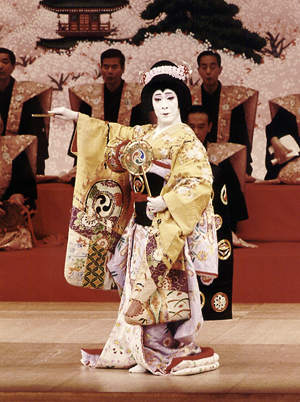![]() Kabuki
Kabuki
 Kabuki かぶき(歌舞伎)is a traditional Japanese form of theater with its origins in the Edo period. Kabuki, in contrast to the older surviving Japanese art forms such as the Noh theater, was the popular culture of the townspeople and not of the higher social classes.
Kabuki かぶき(歌舞伎)is a traditional Japanese form of theater with its origins in the Edo period. Kabuki, in contrast to the older surviving Japanese art forms such as the Noh theater, was the popular culture of the townspeople and not of the higher social classes.
Kabuki plays are about historical events, moral conflicts in love relationships and other such themes. The actors use an old fashioned language which is difficult to understand even for some Japanese people. They speak in a monotonous voice and are accompanied by traditional Japanese instruments.
The kabuki stage (kabuki no butai, かぶきのぶたい、歌舞伎の舞台) is a rotating stage and is further equipped with several gadgets like trapdoors through which the actors can appear and disappear. Another specialty of the kabuki stage is a footbridge (hanamichi、はなみち) that leads through the audience.
In the early years, both men and women acted in Kabuki plays. Later during the Edo period, the Tokugawa Shogunate forbade women from acting in the plays, a restriction that survives to the present day. Several male kabuki actors are, therefore, specialized in playing female roles (onnagata, おんながた).
The best place for tourists to see a Kabuki play is in the Kabukiza Theater in the Ginza district in Tokyo , where it is possible to rent English headphones and see just one act of a play (instead of sitting through a whole performance which may last more than three hours).
![]() Katakana Words カタカナのことば(カタカナの言葉)
Katakana Words カタカナのことば(カタカナの言葉)
Japanese has as many ways to describe types of rain as Eskimos have to describe types of snow.
| シトシト | Sound of drizzling rain. |
| ポツポツ | Sound of big scattered drops. |
| ザーザー | Sound of heavy rain (It rains cats and dogs) |
| パラパラ | Sound of small drops. |
![]() Writing Practice
Writing Practice
Practice writing each sentence in Japanese. When you finish, click each link to view a correct answer.
| My friend is Japanese. | わたしのともだちは、にほんじんです。(私の友達は、にほんじんです。) |
| Your mother is beautiful. | あなたのおかあさんは、きれいです。(あなたのお母さんは、綺麗です。) |
| Our class is interesting. | わたしたちのクラスは、おもしろいです。(私達のクラスは、面白いです。) |
| Your books are old. | あなたのほんは、ふるいです。(あなたの本は、古いです。) |
| Her house is big. | かのじょのうちは、おおきいです。(彼女の家は、大きいです。) |
| My elder brothers are smart. | わたしのあには、あたまがいいです。(私の兄は、頭が良いです。) |
| My hobbies are fun. | わたしのしゅみは、たのしいです。(私の趣味は、楽しいです。) |
![]() Graded Assignments
Graded Assignments
Please return to the Section 2 Tasks & Assignments folder to complete the graded assignments for Section2, Part D.

